|
|
|
Sort Order |
|
|
|
Items / Page
|
|
|
|
|
|
|
| Srl | Item |
| 1 |
ID:
189989
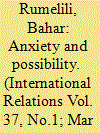

|
|
|
|
|
| Summary/Abstract |
This is the introduction to the forum, Anxiety and possibility: the many future(s) of COVID-19. It summarizes the contributions within a common framework and situates them in the extant literature.
|
|
|
|
|
|
|
|
|
|
|
|
|
|
|
|
| 2 |
ID:
079944


|
|
|
|
|
| Publication |
2007.
|
| Summary/Abstract |
This symposium addresses the role of wars and crises as mechanisms of international change. Over the past two decades, the international system has undergone a number of remarkable transformations, from the end of the Cold War to the emergence of an ongoing "War on Terror," and from the collapse of statist development models to the emergence of a contested-if evolving-neoliberal "Washington Consensus." This volatility exceeds any underlying shifts in economic structures or the distribution of capabilities, and raises important questions regarding the roles of agency, uncertainty, and ideas in advancing change. In this introduction we examine the role of wars and economic crises as socially constructed openings for change. We attempt three things: to critique materialist approaches in the security and political economy issue areas, to outline the distinctive contribution that an agent-centered constructivist understanding of such events offers, and to offer a framework for the study of such events, one which highlights an expanded range of elite-mass interactions.
|
|
|
|
|
|
|
|
|
|
|
|
|
|
|
|
| 3 |
ID:
172829
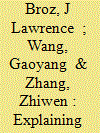

|
|
|
|
|
| Summary/Abstract |
We analyze the factors that increase the likelihood that other nations will follow China's global economic leadership. While our theoretical framework incorporates the conventional argument that China pulls in followers with economic benefits, we focus on grievances with the current global order that have the effect of pushing countries toward the rising new leader. We find that grievances about global financial instability are particularly important push factors. Our results show that countries that have experienced more financial crises, more variable capital account policies, more volatile portfolio capital outflows, and more social unrest during IMF programs are more likely to support China's global leadership than leaders of nations that have been less exposed to these problems. We find no evidence that grievances about global governance, or grievances about discriminatory US trade policies, are related to foreign support for China's global economic leadership. Overall, our evidence is consistent with the interpretation that leaders want to reform and preserve the WTO and the IMF, which have worked reasonably well for them under US leadership. At the same time, they have incentives to follow China's economic leadership on global capital flows, emphasizing long-term infrastructure and development finance over short-term flows which, under the current order, have imposed large costs on many economies.
|
|
|
|
|
|
|
|
|
|
|
|
|
|
|
|
| 4 |
ID:
130930


|
|
|
|
|
| Publication |
2014.
|
| Summary/Abstract |
We argue that system-level international changes have made secessionism more attractive since 1945, and that this is one of the reasons for the recent Proliferation of Aspiring States. Using original data on secessionist movements between 1816 and 2011, we document that secessionism became significantly more common after 1945. Whereas much of the existing literature explains secessionism by pointing to local or unit-level factors, we contend that security, economic, and normative changes at the international level have effectively increased the benefits of independence, without a commensurate increase in the costs. We use interviews with representatives of new states, secessionist groups, and international organizations to provide empirical support for these claims. We conclude by considering three extensions of our argument: (i) Does the nature of the changing international environment affect the way in which secessionists attempt to achieve their goals? (ii) What future changes might amplify or depress this trend? (iii) Who are the specific people benefiting from statehood, and can their position within a would-be state help us understand the nature of secessionism today?
|
|
|
|
|
|
|
|
|
|
|
|
|
|
|
|
| 5 |
ID:
087816
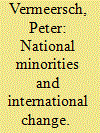

|
|
|
|
|
| Publication |
2009.
|
| Summary/Abstract |
This article explores the question of how the dynamic of interstate relations affects the domestic processes of minority mobilisation. It analyses Ukrainian minority activism in contemporary Poland against the background of the changing relations between Poland and Ukraine. The article argues that the influence of interstate relations on Ukrainian minority activism is more complex than a traditional view of national minority politics would lead us to presume. Starting from this case study, the article argues that there is a need for a contextual and process-oriented understanding of the categories commonly deployed in the study of minority politics in the region.
|
|
|
|
|
|
|
|
|
|
|
|
|
|
|
|
| 6 |
ID:
160054
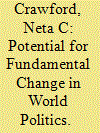

|
|
|
|
|
| Summary/Abstract |
Despite the Realist’s assertion that nothing fundamental changes in world politics, change is the norm in all life and all fields. World politics is no exception. Yes, there are continuities in world politics; they are the persistent, albeit themselves changing, mechanisms that foster fundamental change, the both large and small alterations in the nature of agents, structures, processes, and the content of arguments. Sometimes things change slowly, they evolve. And sometimes radical changes occur in a relatively short period of time; we might think of the latter as phase changes or radical ruptures at tipping points. But often those ruptures have been preceded by decades of slower work by advocates of change toiling in civil societies or specialized communities. Thus, a great deal of effort goes into not only making change but also resisting change.
|
|
|
|
|
|
|
|
|
|
|
|
|
|
|
|
| 7 |
ID:
086293
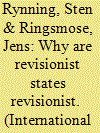

|
|
|
|
|
| Publication |
2008.
|
| Summary/Abstract |
In this article, we argue that Realism recently has eschewed big and important questions of war and peace and that revived Classical Realism can help bring Realism back on track. Modern Realists tend to assume that states are either all status quo players or all revisionists, and the result is a slippery grasp of the sources and dynamics of international change. To revive Classical Realism, we examine three dominant sets of criticism. We notably return to the classical texts of Realism to show that the classics were in fact not reductionist: they did not reduce either systemic or national phenomena (third and second image theory) to human nature (first image). Classical Realists understood the many intricate and delicate connections between these levels, and it is modern era Realists who are reductionists because they reduce explanations to systemic phenomena. We show how Classical Realism can respond in strength to its critics and ask the kind of research questions that again will advance our understanding of international change.
|
|
|
|
|
|
|
|
|
|
|
|
|
|
|
|
|
|
|
|
|